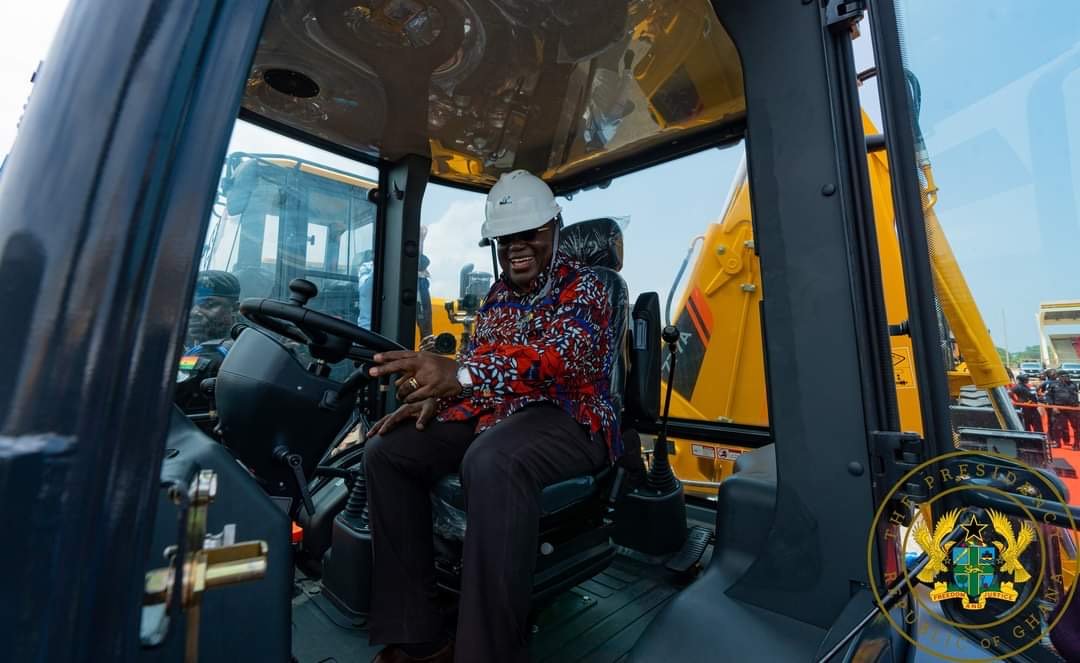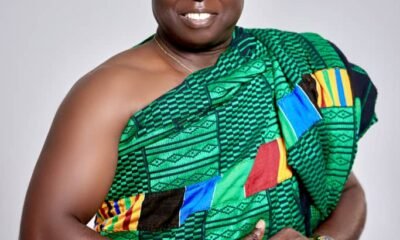News
President Akufo-Addo launches ambitious District Road Improvement Programme

In a significant move towards bolstering Ghana’s infrastructure, President Nana Addo Dankwa Akufo-Addo launched the District Road Improvement Programme (DRIP) and commissioned essential equipment at Black Star Square yesterday.
The event, aimed at enhancing the country’s road networks, marked a pivotal milestone in the government’s ongoing efforts to decentralize development and improve the quality of life for Ghanaians.
In his address, President Akufo-Addo highlighted the critical role of road infrastructure in economic growth and social development. “Roads connect communities, facilitate trade, enable access to education and healthcare, and ultimately improve the quality of life for the citizenry,” he stated.
Despite significant progress in recent years, the President acknowledged that many district roads remain in poor condition, impeding economic activities and development.
The DRIP is designed to empower Metropolitan, Municipal, and District Assemblies (MMDAs) with the necessary resources and equipment to rehabilitate and maintain roads within their areas.
This initiative aligns with the government’s commitment to decentralization, providing local authorities with the tools to effect meaningful change.
The President announced the commissioning of a comprehensive fleet of 2,240 pieces of equipment, including motor graders, backhoes, rollers, wheel loaders, bulldozers, tipper trucks, concrete mixers, water tankers, and low beds.
These machines are expected to play a crucial role in the nationwide improvement of road infrastructure.
A four-member committee at each MMDA will oversee the implementation of the programme, ensuring high standards of quality and accountability.
The committees will include technical officers from the Ministry of Local Government, Decentralisation and Rural Development, and the Ministry of Roads and Highways, along with a representative from the 48 Engineer Regiment of the Ghana Armed Forces.
The Metropolitan, Municipal, and District Chief Executives (MMDCEs) will chair these committees.
President Akufo-Addo emphasized the job creation potential of the DRIP, projecting the creation of 10,000 jobs for mechanics, engineers, and artisans.
He described the nation’s road network as the “circulatory system of our economy,” crucial for commerce, education, and healthcare.
Reflecting on past achievements, the President noted that from 2017 to December 2023, his administration completed 12,830 kilometers of roads and added six interchanges, a significant increase compared to the 4,636 kilometers and five interchanges completed during the Mills/Mahama era from 2009 to 2016.
Current projects include ten new interchanges, with five expected to be completed by the end of the year and five more by 2025.
The President stressed the importance of maintaining local road networks for economic development. Efficient travel reduces time and costs, boosting local economies and productivity.
By empowering local authorities with resources and equipment, the government aims to foster a sense of ownership and responsibility, ensuring that road projects are tailored to meet local needs and conditions.
President Akufo-Addo called for a collaborative approach to the success of the DRIP. He urged MMDCEs to adhere to the operational manual issued by supervising ministries and stakeholders, ensuring proper use and maintenance of the equipment.
He also called on the Ministry of Local Government, Decentralisation and Rural Development to establish monitoring and evaluation mechanisms to track progress and ensure accountability.
In his concluding remarks, the President reiterated the government’s commitment to improving road networks across Ghana, launching a new era of progress and development. “Together, we can build a Ghana where every citizen has the opportunity to thrive, where our communities are connected, and where our nation can continue to grow and prosper,” he concluded.
The launch of the DRIP is a significant step towards transforming Ghana’s road infrastructure, promising enhanced connectivity, economic growth, and improved quality of life for all citizens.
News
Damango wages war on shisha smoking among minors

Troubled and anxious citizens in Damongo of the Savannah Region have expressed concerns about the number of young people, believed to be under the age of 18, involved in ‘shisha’ smoking in pubs and drinking spots within the township.
Eyewitnesses say the minors were seen patronising nightlife venues, where Shisha smoking happen in the open.
The situation has sparked renewed public concern over the enforcement of child protection laws and regulations governing the operations of entertainment centres in the municipality and country as a whole.
An eyewitness, who spoke to The Spectator on conditions of anonymity for security reasons, noted that the situation was becoming increasingly common.
“This is not a one-off incident. It is becoming very common, but residents like us cannot openly report or speak about it because our lives will be at risk,” he said.
Under Ghanaian law, minors were prohibited from patronising Shisha.
Public health experts have consistently warned that shisha use exposes users to harmful substances that can negatively affect brain development, respiratory health, and overall well-being, particularly among young people.
The residents believe the alleged incidents point to broader challenges relating to youth supervision, substance abuse, and weak enforcement of existing regulations and have called on municipal authorities, security agencies, and regulatory bodies to intensify monitoring of pubs and entertainment centres to ensure compliance with the law.
In an effort to address the menace, Mr Salisu Be-Awurbi, the Savannah Regional Minister, has led public education campaigns, engaged security agencies, and supported enforcement actions to address the rising use of illicit substances in the region.
Wura Kelly Seidu Boresah I, the Chief of Damongo, has also called on all stakeholders including parents, community leaders, institutions, and young people to actively support efforts to curb drug abuse, warning that the rising consumption of hard drugs poses a serious health threat to the future of the youth in the Savannah Region.
He also cautioned individuals involved in the sale and distribution of illicit drugs to immediately desist from the practice, stressing that offenders will face arrest and prosecution in accordance with the law.
From Geoffrey Buta, Damongo, Savannah Region
Join our WhatsApp Channel now!
https://whatsapp.com/channel/0029VbBElzjInlqHhl1aTU27
News
Ga Mantse endorses initiative to end domestic voilence

Dr Theresa Baffour, an advocate for ending violence and Chief Executive Officer (CEO) of SAHM SAHW Foundation, has said that society plays a critical and pivotal role in breaking the cycle of domestic violence.
According to her, domestic violence is a major contributor of making women, who are mostly the victims, mentally derailed and unable to engage in economic activities.
She said this when the foundation called on the Ga Mantse, Nii Tackie Teiko Tsuru II, to solicit support for the initiative by the “Strong and Healthy Minds, Strong and Healthy Women” (SAHM SAHW) to combat domestic violence within the Ga State.
The visit was occasioned by the fact that domestic violence cases have become quite prevalent in the Ga communities and is retarding growth.
According to her, the canker was an impediment to national development because the victims were usually tortured and would have to go through series of therapies to return to the right state of mind.
Dr Baffour mentioned that Gender-Based Violence (GBV) places a mental toll on women, and was, therefore, important to break the cycle through comprehensive mental health support, crisis intervention and empowerment programmes in communities with high rates of GBV.
This intervention, she underscored, would help in empowering the denigrated victim of domestic violence to soundly heal, build and thrive.
Dr Baffour added that the initiative would provide holistic, trauma-informed mental health care and advocacy for young women affected by domestic violence.
According to her, the above statement would create safe spaces for healing and equipping them with entrepreneurial skills for renewed hope and empowered life.
The Ga Mantse pledged his support for the laudable initiative to combat domestic violence and also acknowledged the need to address it in the Ga State.
Further endorsement came from Justice Julia Naa-Yarley Adjei Amoah, Chief of Staff at the Office of the Ga Mantse, as she commended the team of SAHM SAHW Foundation for taking a bold step to end the canker in the Greater Accra.
She added that it was a step in the right direction to save vulnerable women from torture, stress and emotional abuse.
By Alfred Nii Arday Ankrah














